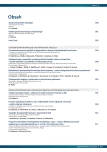Epidemiology and population-based screening of colorectal cancer in the Czech Republic according to recent data
Authors:
L. Dušek 1,2; O. Májek 1,2; J. Mužík 1,2; D. Malúšková 1,2; T. Pavlík 1,2; J. Gregor 1; Š. Suchánek 3; B. Seifert 4; M. Zavoral 3
Authors‘ workplace:
Institut biostatistiky a analýz, LF a PřF MU, Brno
1; Ústav zdravotnických informací a statistiky ČR, Praha
2; Oddělení gastrointestinální onkologie, Interní klinika 1. LF UK a ÚVN – VFN Praha
3; Ústav všeobecného lékařství, 1. LF UK v Praze
4
Published in:
Gastroent Hepatol 2015; 69(6): 509-517
Category:
Gastrointestinal Oncology: Original Article
doi:
https://doi.org/10.14735/amgh2015509
Overview
Over a number of years, the Czech Republic has had one of the highest incidences and mortality rates for colorectal cancer globally. Each year in the Czech Republic nearly 8,000 people are diagnosed with colorectal cancer and there are approximately 3,600 deaths from the disease. The prevalence of colorectal cancer patients reached almost 55,000 by 2013, and there is a 4% increase each year. Moreover, the prevalence involves a large proportion of patients diagnosed with advanced colorectal cancer, as more than 50% of colorectal cancer cases each year are diagnosed in clinical stages III and IV. The high epidemiological burden itself justifies the need for an organised screening programme, which has a strong background in evidence-based medicine as regards this particular disease. The Czech National Colorectal Cancer Screening Programme has sufficient capacity and is guaranteed by general practitioners, gastroenterologists and gynaecologists. Personalised invitations for Czech citizens to cancer screening programmes were launched in January 2014, and the programme has since transformed into the desirable regime of the so-called population-based screening. The response rate was 17.3% in the first round of invitations, and 11.8% in the second round of invitations. The screening coverage has increased significantly as a result of personalised invitations, reaching 30.8% of the entire target population in 2014. Evaluation of the first stage of personalised invitations has again confirmed its significance and its positive impact on the effectiveness of the prevention programme. In the long term, the ongoing screening programme has influenced the main epidemiological trends, i.e. a stabilised or even slightly decreasing incidence and longer survival rates of colorectal cancer patients.
Key words:
malign tumour – colon – rectum – prevention – screening – personalised invitation
The authors declare they have no potential conflicts of interest concerning drugs, products, or services used in the study.
The Editorial Board declares that the manuscript met the ICMJE „uniform requirements“ for biomedical papers.
Submitted:
5. 11. 2015
Accepted:
30. 11. 2015
Sources
1. Ústav zdravotnických informací a statistiky ČR. Národní onkologický registr (NOR). [online]. Dostupné z: www.uzis.cz/ registry-nzis/ nor.
2. Dušek L, Mužík J, Kubásek M et al. Epidemiologie zhoubných nádorů v České republice. Brno: Masarykova univerzita 2005. [online]. Dostupné z: www.svod.cz.
3. Ferlay J, Parkin DM, Curado MP et al. Cancer Incidence in Five Continents, Vol. I – IX. IARC CancerBase No. 9. Lyon: International Agency for Research on Cancer 2010. [online]. Available from: http:/ / ci5.iarc.fr.
4. Ferlay J, Soerjomataram I, Ervik M et al. GLOBOCAN 2012 v1.0, cancer incidence and mortality worldwide: IARC CancerBase 11. Lyon: International Agency for Research on Cancer 2013. [online]. Available from: http:/ / globocan.iarc.fr.
5. Český statistický úřad. Naděje dožití při narození v letech 1950–2014. [online]. Dostupné z: www.czso.cz/csu/czso/nadeje_doziti_pri_narozeni_v_letech_1950_2014.
6. Pavlík T, Májek O, Büchler T et al. Trends in stage-specific population-based survival of cancer patients in the Czech Republic in the period 2000 – 2008. Cancer Epidemiol 2014; 38(1): 28 – 34.
7. De Angelis R, Sant M, Coleman MP et al. Cancer survival in Europe 1999 – 2007 by country and age: results of EUROCARE-5-a population-based study. Lancet Oncol 2014; 15(1): 23 – 34. doi: 10.1016/ S1470-2045(13)70546-1.
Labels
Paediatric gastroenterology Gastroenterology and hepatology SurgeryArticle was published in
Gastroenterology and Hepatology

2015 Issue 6
- Possibilities of Using Metamizole in the Treatment of Acute Primary Headaches
- Metamizole at a Glance and in Practice – Effective Non-Opioid Analgesic for All Ages
- Metamizole vs. Tramadol in Postoperative Analgesia
- Spasmolytic Effect of Metamizole
- The Importance of Limosilactobacillus reuteri in Administration to Diabetics with Gingivitis
-
All articles in this issue
- Gastrointestinal oncology
- Pediatric gastroenterology and hepatology
- The diagnosis and therapy of colorectal cancer from a pharmacoeconomic perspective
- Czech gastroenterology succeeded again in Dr. Bares Award competition
- 33rd Czech and Slovak Gastroenterology Congress, 12th– 14th November 2015
- Two continents, two countries, one common topic – hepatogastroenterology
- The selection from international journals
- Thanks to reviewers
- Answer to the quiz
- Ursodeoxycholic acid (Ursosan® capsules)
- Epidemiology and population-based screening of colorectal cancer in the Czech Republic according to recent data
- Molecular spectroscopy of blood plasma – towards the diagnostics of pancreatic cancer?
- Preoperative staging in patients with pancreatic cancer
- Exclusive enteral nutrition – first-line therapy of Crohn’s disease in children
- Defective IL-10 signalling and very-early-onset inflammatory bowel disease
- The results of liver transplantation in Slovak children
- Progressive familial intrahepatic cholestasis type 2 – paediatric patients followed at the Paediatric Clinic of the 2nd Medical Faculty, University Hospital Motol, Prague
- The importance of genetic testing in children with idiopathic chronic pancreatitis
- Urolithiasis in patients with inflammatory bowel diseases
- Gastroenterology and Hepatology
- Journal archive
- Current issue
- About the journal
Most read in this issue
- Ursodeoxycholic acid (Ursosan® capsules)
- Exclusive enteral nutrition – first-line therapy of Crohn’s disease in children
- The results of liver transplantation in Slovak children
- The importance of genetic testing in children with idiopathic chronic pancreatitis
